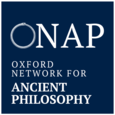Stoic Philosophy of Language - Graduate Seminar (HT 2023)
Th. 11 – 1, weeks 1-6, Corpus Christi College Seminar Room
Further information from the seminar convenor, Prof. Marion Durand:
This seminar will survey some of the Stoic views on language. We’ll consider the place of the study of language in the Stoic system as well as some of the idiosyncratic and sophisticated semantic theories the Stoics developed with a focus on theories related to propositions, reference, and predication. Questions we will be particularly interested in include: What constitutes meaning, according to the Stoics? How do the Stoics conceive of linguistic items? How does language function as a tool for communication? What is the relationship of language to objects in the world?
Participation is open to and encouraged from any Philosophy graduate student with an interest in ancient philosophy or the history of the philosophy of language, as well as any Classics graduate student interested in the philosophy language and the history of grammar. No previous knowledge is required.
The schedule for the term can be found below. Volunteer presenters are invited to express interest in briefly (10-15min would suffice) introducing a problem or question relevant to the week’s topic. Please do contact marion.durand@philosophy.ox.ac.uk if you would like to present.
A good general introduction to some of the relevant questions and material is Bobzien, S. (1999). Logic: The Stoics. in K. Algra, J. Barnes, J. Mansfeld, and M. Schofield (ed.), The Cambridge History of Hellenistic Philosophy. Cambridge: CUP. Section III.1-4 92-121.
As far as possible primary texts will be taken from Long, A.A. and Sedley, D.N. (1987). The Hellenistic Philosophers. Cambridge: CUP. References below are to chapters (e.g. “Long and Sedley 26” refers to chapter 26 and all the passages therein). Additional material will be circulated or posted to Canvas.
Provisional schedule
Week 1: Introduction. Stoic Logic and Dialectic and the Stoic System.
Is there such a thing as “Stoic philosophy of language”? What are some of the challenges in reconstructing Stoic views about language? What are the goals and scope of the study of language and what is its place in Stoic philosophy?
Primary reading (it would be useful to read this in advance of the first meeting)
Long and Sedley 26 and 31
Additional secondary reading (participants are not expected to have read this)
Bronowski, A. 2019. The Stoics on Lekta: All There is to Say. New York: OUP. chapter 1.
Week 2: Language and Lekta
What are lekta? How do they relate to language and to objects in the world? How and on what basis are lekta classified? Do all words express lekta?
Primary reading: Long and Sedley 33
Additional secondary reading: Frede, M. (1994b). The Stoic Notion of a Lekton. In S. Everson (ed.), Language. CUP. 109-128.
Week 3: Propositions
What are Stoic propositions? How and on what basis are they classified? What constitutes them and how are they structured? How do they differ from other lekta?
Primary reading: Long and Sedley 34-35
Additional secondary reading: Brunschwig, J. 1994. Remarks on the classification of simple propositions in Hellenistic logics. In Papers in Hellenistic Philosophy. Cambridge: CUP. 57-71.
Week 4: Reference
Can we reconstruct a Stoic theory of reference? What words refer and how? What role does reference and referring expressions play in language and in propositions?
Primary reading: All material will be circulated/posted to Canvas
Additional secondary reading: Lloyd, A.C. (1971). Grammar and Metaphysics in the Stoa. In A.A. Long (ed.) Problems in Stoicisim. London: Athlone. 58-74. or Lloyd, A.C. (1978). Definite propositions and the concept of reference. In J. Brunschwig (ed.) Les Stoïciens et leur logique. Paris: Vrin. 285-96.
Week 5: Predication
Is there a Stoic theory of predication? What are Stoic predicates and how do the Stoics conceive of them? How do predicates relate to verbs? How do they relate to objects in the world? What role do they play in propositions?
Primary reading: All material will be circulated/posted to Canvas
Weeks 6: Puzzles and Paradoxes
How does the Stoic interest in puzzles or semantic paradoxes relate to their philosophy of language? To what extent can their views on language help them tackle puzzles and paradoxes?
Primary reading: Long and Sedley 37
Additional secondary reading: Mignucci, M. (1999). Logic: The Stoics. in K. Algra, J. Barnes, J. Mansfeld, and M. Schofield (ed.), The Cambridge History of Hellenistic Philosophy. Cambridge: CUP. Section III.8 121-176.




